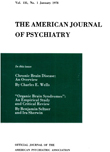Age, dementia, dyskinesias, and lithium response
Abstract
Nineteenth-century neuropsychiatrists felt that the aged bipolar patient usually developed chronic mania, which eventually turned into dementia. The authors' elderly patients seemed to experience few such denouements, so they evaluated the course and treatment response of 81 bipolar patients over the age of 55. Fifty-six responded well to lithium. Advanced age had no effect on course or outcome. However, with increased clinical evidence of neurological illness there was an increased incidence of chronic mania, a poorer response to lithium, and more frequent and severe neurotoxicity. Extrapyramidal syndromes were particularly devastating.
Access content
To read the fulltext, please use one of the options below to sign in or purchase access.- Personal login
- Institutional Login
- Sign in via OpenAthens
- Register for access
-
Please login/register if you wish to pair your device and check access availability.
Not a subscriber?
PsychiatryOnline subscription options offer access to the DSM-5 library, books, journals, CME, and patient resources. This all-in-one virtual library provides psychiatrists and mental health professionals with key resources for diagnosis, treatment, research, and professional development.
Need more help? PsychiatryOnline Customer Service may be reached by emailing [email protected] or by calling 800-368-5777 (in the U.S.) or 703-907-7322 (outside the U.S.).



